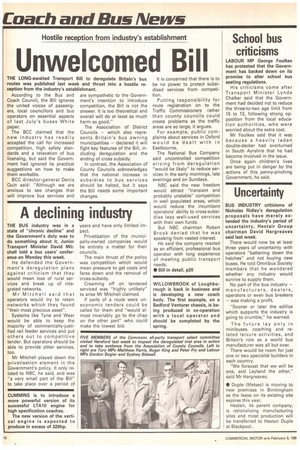Unwelcomed
Page 20

If you've noticed an error in this article please click here to report it so we can fix it.
Bill
THE LONG-awaited Transport Bill to deregulate Britain's bus routes was published last week and thrust into a hostile reception from the industry's establishment.
According to the Bus and Coach Council, the Bill ignores the united voices of passengers, local councillors and bus operators on essential aspects of last July's buses White paper.
The BCC claimed that the new industry has readily accepted the call for increased competition, high safety standards and a relaxation of bus licensing, but said the Government had ignored its practical suggestions on how to make them workable.
BCC director-general Denis Quin said: "Although we are anxious to see changes that will improve bus services and are sympathetic to the Government's intention to introduce competition, the Bill is not the answer. It is too theoretical and overall will do at least as much harm as good."
The Association of District Councils — which also represents Britain's bus owning municipalities — declared it will fight key features of the Bill, including deregulation and the ending of cross subsidy.
In contrast, the Association of County Councils acknowledges that the national increase in subsidies to bus services should be halted, but it says the Bill needs some important changes. It is concerned that there is to be no power to protect subsidised services from competition.
Putting responsibility for route registration on to the Traffic Commissioners rather than county councils could create problems as the traffic areas are so large, it argues.
For example, public complaints about services in Oxford would be dealt with in Eastbourne.
The National Bus Company said uncontrolled competition arising from deregulation "would be likely" to reduce services in the early mornings, late evenings and on Sundays.
NBC said the new freedom would attract "transient and probably unstable" competition in well populated areas, which would reduce the incumbent operators' ability to cross-subsidise less well-used services with their own funds.
But NBC chairman Robert Brook denied that he was speaking from vested interest.
He said the company reacted as an efficient, professional bus operator with long experience of meeting public transport needs.
• Bill in detail, p20


































































































